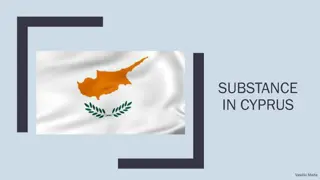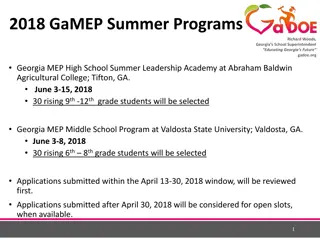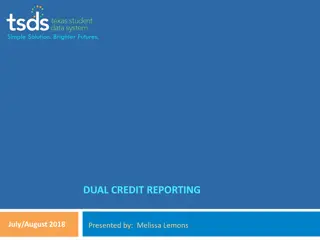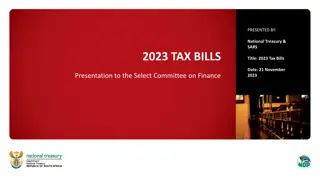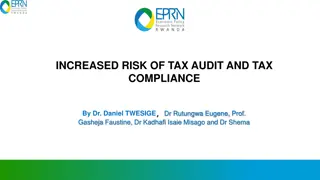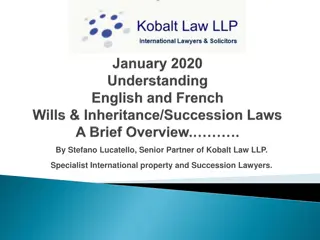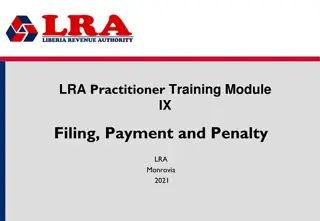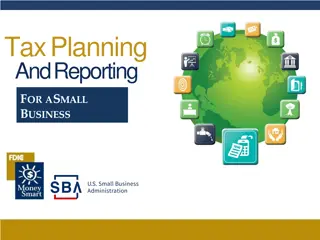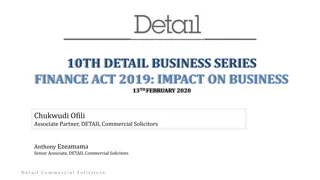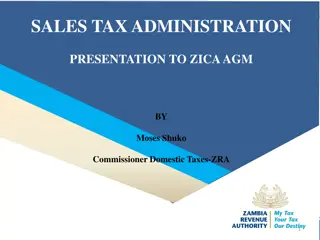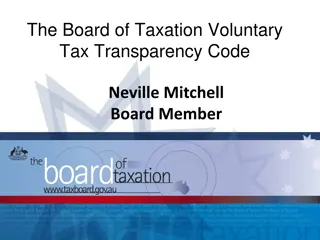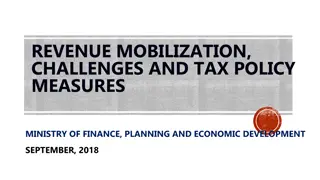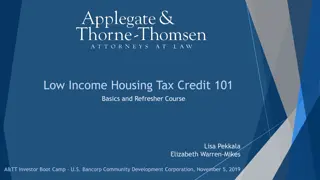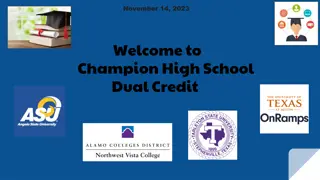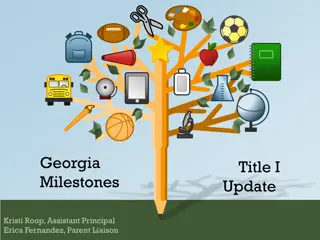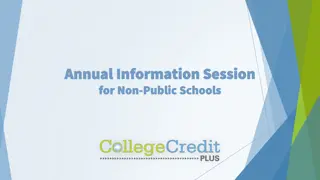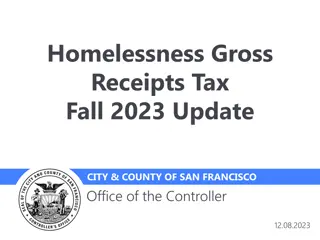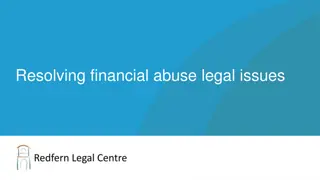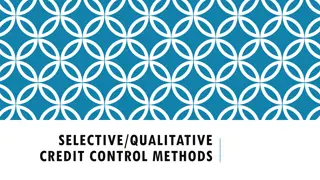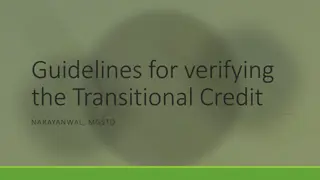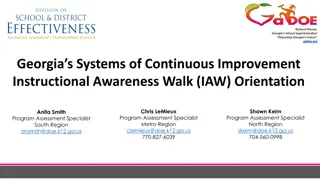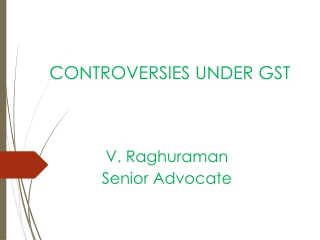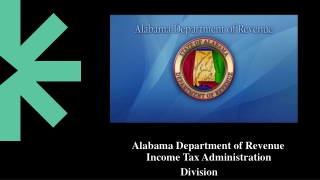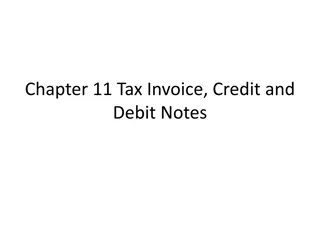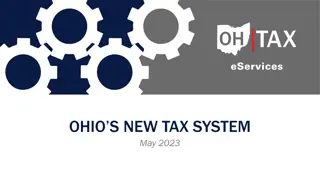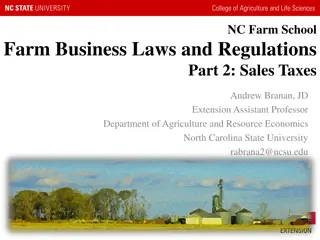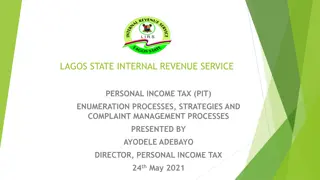Maximizing Educational Choice in Georgia Through the GOAL Tax Credit Program
Explore a comprehensive roadmap for CPAs, financial advisors, and business owners interested in supporting educational choice for Georgia students through the GOAL Tax Credit program. Learn about the Georgia GOAL Program overview, double-tax benefits, contribution limits, and how IRS regulations create opportunities for tax deductions. Discover the impact of significant legislation and expanded opportunities in 2022 for providing scholarships through Student Scholarship Organizations.
Download Presentation

Please find below an Image/Link to download the presentation.
The content on the website is provided AS IS for your information and personal use only. It may not be sold, licensed, or shared on other websites without obtaining consent from the author. Download presentation by click this link. If you encounter any issues during the download, it is possible that the publisher has removed the file from their server.
E N D
Presentation Transcript
A Roadmap for CPAs, Financial Advisors, and Business Owners Interested in Providing Educational Choice for Georgia Students Through the GOAL Tax Credit Jim Kelly General Counsel Lisa Kelly Executive Director 1
Lisa Kelly Jim Kelly General Counsel Executive Director 2
Georgia GOAL Program Overview Double-Tax Benefit for Pass-Through Business Entities Table of Contents Significant New Legislation Impacting 2022 Expanded 2022 Opportunity 3
Georgia GOAL Overview Georgia GOAL Overview Georgia s elected officials enacted the popular Education Tax Credit law in 2008, as our state became an early leader in providing educational choice for families through tax credit scholarships, now available in 19 states, nationwide Taxpayers may contribute to SSOs up to certain limits, designating qualified private schools, and receive a 100% Georgia income tax credit and possible federal business expense deduction Independent studies consistently reveal fiscal and economic benefits, with Kennesaw State s Education Economic Center s 2020 report citing $53.2 million in taxpayer savings in the 2018-19 academic year alone. Georgia lawmakers increased the annual cap on education tax credits from $58 million to $100 million, beginning in 2019 4
Education Tax Credit Contribution Limits Education Tax Credit Contribution Limits Individual and business taxpayers receive 100% Georgia income tax credits for contributions to Student Scholarship Organizations (SSOs) up to the following limits: $1,000 (single) $2,500 (married filing jointly) Pass-through entity - $10,000 per individual with ownership in S Corp, LLC or partnership, if they would have that level of income tax liability for their share of pass-through ownership C corporations & trusts: 75% of their annual Georgia income tax liability 5
IRS Regulations Create an Exception IRS Regulations Create an Exception On August 11, 2020, the IRS published regulations confirming that a payment made by a pass-through business to a charity (such as a SSO) may qualify for a federal ordinary and necessary business expense deduction, even where the owners receive a state income tax credit for the payment Businesses can deduct payments relating to their trade or business that are made with the reasonable expectation of financial return commensurate with (but, according to the IRS, not necessarily equal to) the payment The business payment is a deductible advertising or marketing expense, which reduces the federal taxable net income of the pass-through business owner, resulting in federal tax savings 6
The Test to Determine if the The Test to Determine if the Payment is Deductible Payment is Deductible If the business reasonably believes the program will generate a significant degree of name recognition and goodwill in the communities where it operates and thereby increase its revenue, a federal business expense deduction may be available even though the business does not have a direct business relationship with the SSO or designated private school. An example in the IRS Regulations explains that the business expense deduction may be available for payments made by a business located in a state for use in projects that improve conditions in the state, which could include greater K-12 educational opportunities that improve educational outcomes, result in fiscal and economic savings for the state, and attract business to the state. The business must reasonably believe that the payments will generate a significant degree of name recognition and goodwill in the communities where it operates and thereby increase its revenue. 7
Georgia DOR Permits Pass-Through Owners to Receive State Income Tax Credit When Entity Takes a Federal Business Expense Deduction Rule 560-7-8-.47 (as amended) relating to the Georgia GOAL Tax Credit program. Where a pass-through entity makes a payment to a SSO that is deductible as a business expense, the QEE tax credits will be earned by its members, shareholders, or partners based on their profit/loss percentage at the end of the tax year and the applicable maximum limits of Georgia law. Important note: applications must be submitted to Georgia GOAL for each pass-through owner s share of the QEE tax credit, per the total payment to be made by the business. Georgia pass-through business owners can receive the double tax benefit (of a federal deduction and state credit) originally available under the Georgia GOAL program! 8
2021 Momentum 2021 Momentum CPAs and financial advisors throughout Georgia are increasingly recommending the GOAL tax credit opportunity, following the August 2020 IRS regulations. In 2019, all $100 million of available tax credits were consumed. In 2020, 97% of the $100 million cap was met, even in that challenging year. More than 80% of available credits have been consumed as of May 15, 2021, with many business owners and their financial advisors strategically waiting until later in the year to participate. We believe the entire $100 million cap will be met in the current year, with heavy activity in the late 3rd quarter and the 4th quarter of this year. 9
2022 Opportunity 2022 Opportunity IRS to Permit SALT Workaround SALT Workaround IRS to Permit IRS Allows SALT Workaround for Pass-through Entities Paying State Income Taxes Although some Georgia pass-through business owners can receive the double tax benefit originally available under the GOAL program, what about those businesses who cannot justify the taking of a federal business expense deduction in connection with their payments to SSOs, designated for private schools? In recently published Notice 2020-75, the IRS has announced that it will be issuing proposed regulations, effective November 9, 2020, that will clarify that state and local income taxes imposed on and paid by a partnership or S corporation with respect to its income are allowed as a deduction by the partnership or S corporation in computing its taxable income or loss for the taxable year of payment, and are not subject to the state and local tax deduction limitation for partners and shareholders who itemize deductions Currently, five states have enacted an elective entity-level tax on partnerships or S corporations: Louisiana, New Jersey, Oklahoma, Rhode Island, and Wisconsin. 10
States Can Now Give Pass States Can Now Give Pass- -through Entities the Option to Pay Income Taxes at the Entity Level Option to Pay Income Taxes at the Entity Level through Entities the For example, New Jersey recently enacted an elective entity-level state income tax on pass-through entities (i.e., the state income tax is on the pass-through entity, not the owners) If a New Jersey S corporation elects to have the tax apply, then the S corporation would pay tax at the entity level and the S corporation would be able to claim a deduction for the entity-level tax. The federal deduction for the New Jersey tax paid would reduce the S corporation s net income that would flow through to the shareholders, thus permitting the shareholders to work around the $10,000 SALT Deduction and receive the tax benefits of a federal deduction and state income tax credit. 11
2022 Opportunity 2022 Opportunity Comes to Georgia Comes to Georgia HB 149, which the Georgia General Assembly passed during its 2021 legislative session, provides that pass-through entities, including S-Corporations and partnerships (including limited liability entities taxed as partnerships), may make an annual election to pay the tax due on income earned by the entity at the entity level at the rate of 5.75%. The election is only available to a pass-through entity that is 100% directly owned and controlled by natural persons (rather than companies or other entities). The election is available for taxable years beginning on or after January 1, 2022. HB 149 specifically provides that the electing entity shall be eligible for the Georgia GOAL credit, being treated as an other entity that is eligible for a credit equal in amount to the payment made to GOAL or 75% of the entity s Georgia income tax liability, whichever is less! 12
Education Tax Credit Contribution Education Tax Credit Contribution L Limits Effective in 2022 Effective in 2022 imits Individual and business taxpayers receive 100% Georgia income tax credits for contributions to Student Scholarship Organizations (SSOs) up to the following limits: $1,000 (single) $2,500 (married filing jointly) Pass-through entity not paying tax at entity level - $10,000 per individual with ownership in S Corp, LLC or partnership Pass-through entity electing to pay tax at entity level 75% of annual Georgia income tax liability C corporations & trusts: 75% of their annual Georgia income tax liability 13
GOAL begins accepting applications for 2022 tax credits on June 1, 2021, which GOAL will submit on first business day of 2022. Georgia GOAL Georgia GOAL Signing Up Signing Up for 2022 for 2022 The GOAL 2022 tax credit application for pass-through entities will allow for two paths: One for pass-through entities electing to pay taxes at the entity level (considered other entity per our program) Another for pass-through entities operating as usual with income/loss flowing to pass-through owners, who pay associated taxes as individuals (considered pass-through entity per our program) It is conceivable that the adoption of this opportunity in Georgia will result in the GOAL cap being met on the first day or very early in 2022. 14
Thank you! Contact us with any questions: lmkelly@goalscholarship.org (770) 828-4625 15
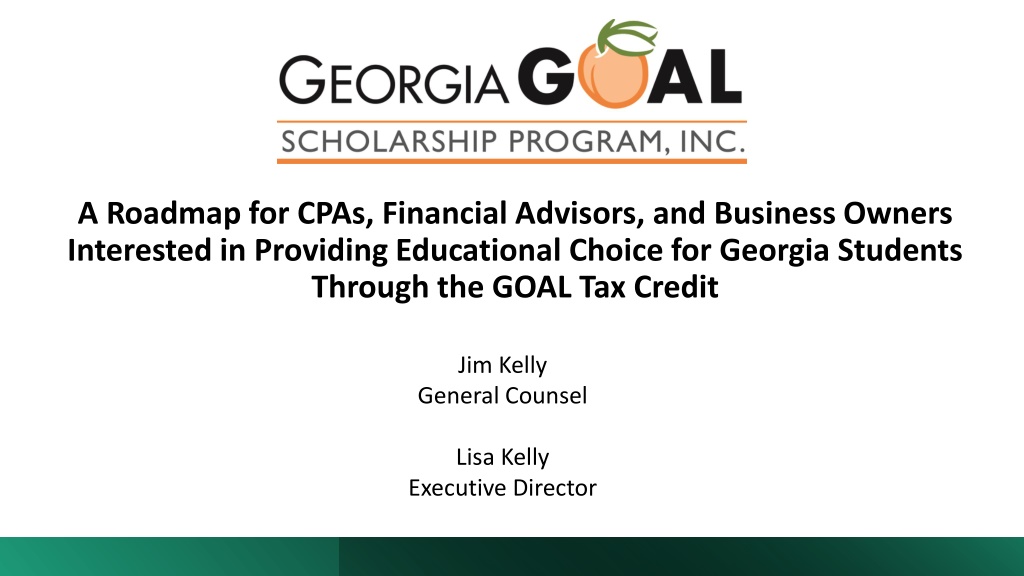

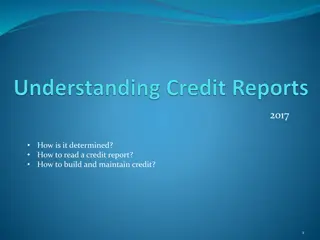

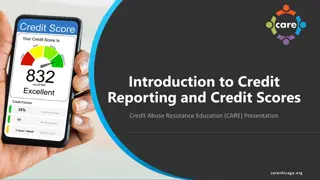

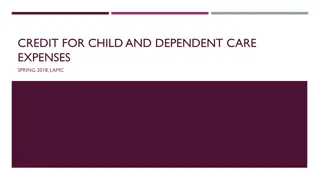
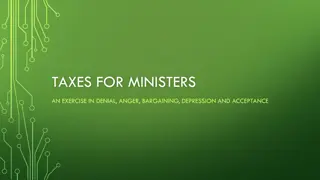



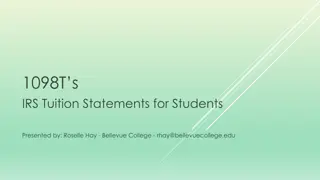
![Town of [Town Name] Real Estate Tax Rates and FY 2024 Budget Summary](/thumb/62211/town-of-town-name-real-estate-tax-rates-and-fy-2024-budget-summary.jpg)
